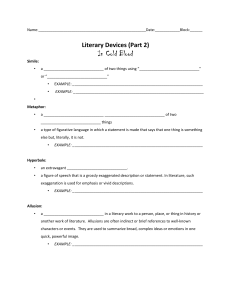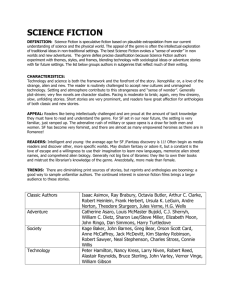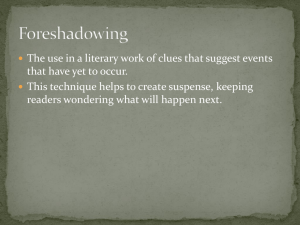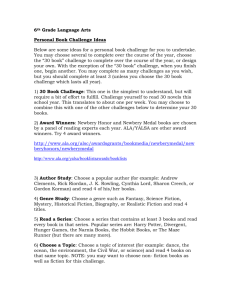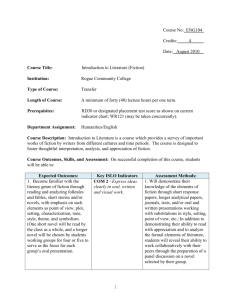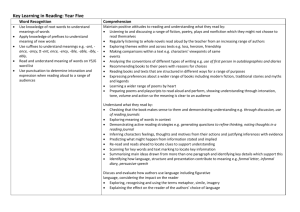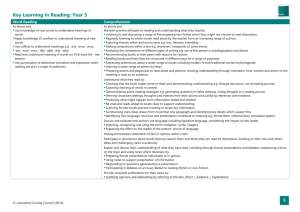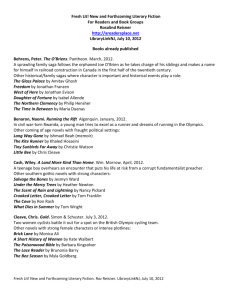new rev Intellect Genres 09 characteristics
advertisement
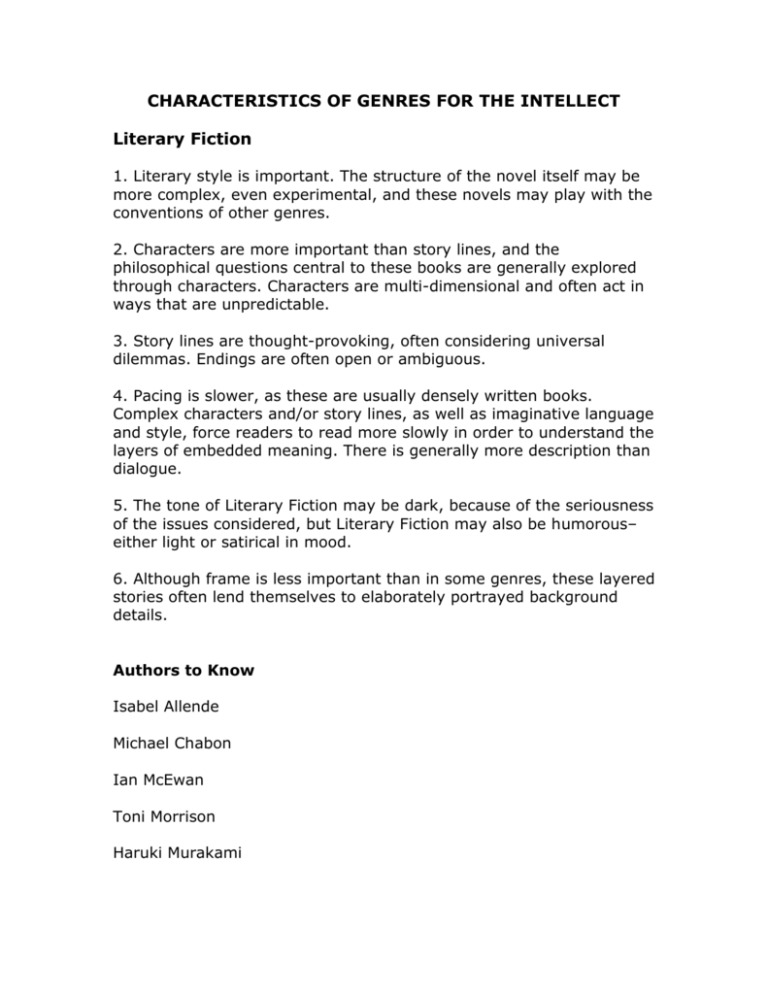
CHARACTERISTICS OF GENRES FOR THE INTELLECT Literary Fiction 1. Literary style is important. The structure of the novel itself may be more complex, even experimental, and these novels may play with the conventions of other genres. 2. Characters are more important than story lines, and the philosophical questions central to these books are generally explored through characters. Characters are multi-dimensional and often act in ways that are unpredictable. 3. Story lines are thought-provoking, often considering universal dilemmas. Endings are often open or ambiguous. 4. Pacing is slower, as these are usually densely written books. Complex characters and/or story lines, as well as imaginative language and style, force readers to read more slowly in order to understand the layers of embedded meaning. There is generally more description than dialogue. 5. The tone of Literary Fiction may be dark, because of the seriousness of the issues considered, but Literary Fiction may also be humorous– either light or satirical in mood. 6. Although frame is less important than in some genres, these layered stories often lend themselves to elaborately portrayed background details. Authors to Know Isabel Allende Michael Chabon Ian McEwan Toni Morrison Haruki Murakami Characteristics of the Mystery Genre 1. The solving of a crime, usually a murder, drives the plot, and the detective, along with the reader, sorts through the available clues to discover the solution and “whodunit.” 2. The story focuses on the investigator or an investigative team and are frequently series. Secondary characters, whether suspects or supporting characters in the investigation, play an important role in the appeal of the Mystery and may also be series characters. 3. The frame in which the Mystery is set--whether a physical location or fascinating background details--plays a crucial role in its appeal. 4. The mood of Mysteries ranges from dark and gritty to lighthearted and witty with a multitude of variations in between. 5. The broad scope of the genre, embracing countries around the world and involving widely differing classes of characters and historical periods, demands a range of language and narrative styles. 6. Since all Mysteries move toward the solution of the puzzle, pacing is relentless and compelling, sometimes slowed by details of time and place, but always moving inexorably toward the solution. Authors to Know Michael Connelly Janet Evanovich Henning Mankell Robert B. Parker Jacqueline Winspear Characteristics of Psychological Suspense 1. Elaborately constructed plots are the hallmark of these stories, which are characterized by frequent twists (both mental and plot), surprises, and layers of meaning. Endings may be unresolved. 2. These books create a world of mental nightmares, and that chilling, disturbing tone drives the stories and keeps the readers off-balance. 3. The interior workings of the mind--even madness--frame these stories, and leave readers off balance, straddling the line between sanity and unreason. 4. Protagonists are often misfits, who may or may not be sympathetic characters. Readers observe the characters rather than participate in their predicaments. 5. Writing style is important in creating this disturbing mood, and these novels are often elegantly written. 6. The pacing is more measured and the physical action less intense than in Suspense novels. These are often densely written novels with more description than dialogue. Authors to Know Peter Abrahams Carol Goodman Jeffry P. Lindsay Ruth Rendell/Barbara Vine Minette Walters Characteristics of Science Fiction 1. This is speculative fiction, frequently set in the future, and it explores moral, social, intellectual, philosophical, and/or ethical questions against a setting outside of everyday reality. 2. Setting is crucial and invokes otherness of time, place, and/or reality. 3. From the jargon of Cyberpunk to the lyrical language of some classic tales, Science Fiction offers a range of styles and language crafted to suit the story line and to reinforce the intellectual and speculative nature of the genre. 4. Titles reflect a wide range of tone or mood from dark to comic. Tone is often used to disorient readers and to highlight the issues. 5. Authors use characters to underscore issues and atmosphere. Aliens and otherworldly creatures emphasize the otherness of these stories. 6. The focus of the story drives the pacing. If there are more adventure elements and physical action, the pacing is usually faster; if ideas are emphasized more, the book generally unfolds at a more leisurely pace. Authors to Know Kathleen Ann Goonan Kim Stanley Robinson Neal Stephenson Harry Turtledove David Weber saricksj@gmail.com 4/10
